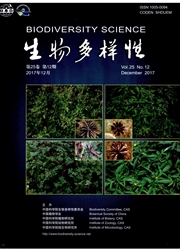

 中文摘要:
中文摘要:
解释群落的物种多样性大小是生态学研究的一个重要的理论和实践问题。人们提出了群落物种多样性的多种假说,Zobel等人提出的种库假说(speciespoolhy pothesis)是生物多样性理论研究的重要发展。该假说认为,一个群落的物种多样性不仅与环境条件和生态过程(ecological process)(如竞争、捕食)有关,也受区域种库(regional species pool)的限制。区域种库是指一个地区可进入某一群落的潜在物种数量,它由地史过程(如冰期、地质年代)和区域过程(物种形成、迁移扩散以及消亡)所决定。按照种库假说,某一生境类型的面积越大,地质年代越古老,物种形成的机会也就越多,因而能适应和分布于该生境的物种也就越多,实际群落中的物种丰富度也就越高。种库在空间上主要有两个层次:区域种库和实际种库,前者指某一生境所拥有的潜在物种数量,主要由生物地理过程(biogeographic processes)所决定;后者则为调查的群落中实际出现的物种数量,主要由竞争等生态过程和区域种库共同决定。本文对种库假说的基本概念、主要内容、种库确定方法等作了介绍,并阐述了作者对这些问题的理解和认识。
 英文摘要:
英文摘要:
Exploring the mechanisms underlying community species richness is a key issue in ecology and conservation biology, and many hypotheses based on small-scale, local processes have traditionally been used as explanations. The species pool hypothesis developed by Zobel et al. suggests that the variation in community species richness is not only associated with contemporary environmental factors and ecological processes (e.g. competition and predation), but also limited by the regional species pool. The regional species pool is the set of species in a certain region that are capable of coexisting in a target community, which is shaped by historical (e.g. glaciation and geological age) and regional processes (e.g. speciation, immigration, dispersion, and extinction). The species pool hypothesis suggests that the larger the area of a habitat type and the greater its geological age, the greater the opportunity for speciation and hence the larger the number of available species adapted to that particular habitat, which will in turn lead to higher community diversity. The species pool is generally studied at two spatial scales: the regional and the actual scales. While the regional species pool is primarily determined by biogeographic processes, the actual species pool (species present in the target community) is determined by both ecological processes (e.g. competition) and the regional pool. In this review, we introduce and discuss the concepts relating to, and evidence for the species pool hypothesis, together with methods for estimating the species pool.
 同期刊论文项目
同期刊论文项目
 同项目期刊论文
同项目期刊论文
 Relationship between variability in aboveground net primary production and precipitation in global g
Relationship between variability in aboveground net primary production and precipitation in global g Scenario analysis on the global carbon emissions reduction goal proposed in the declaration of the 2
Scenario analysis on the global carbon emissions reduction goal proposed in the declaration of the 2 Vertical patterns of soil carbon, nitrogen and carbon: nitrogen stoichiometry in Tibetan grasslands.
Vertical patterns of soil carbon, nitrogen and carbon: nitrogen stoichiometry in Tibetan grasslands. Fractal dimension of soil particle size distribution along an altitudinal gradient in the Alxa range
Fractal dimension of soil particle size distribution along an altitudinal gradient in the Alxa range Temperature dependence, spatial scale, and tree species diversity in eastern Asia and North America.
Temperature dependence, spatial scale, and tree species diversity in eastern Asia and North America. Leaf nitrogen and phosphorus concentrations of woody plants differ in responses to climate, soil and
Leaf nitrogen and phosphorus concentrations of woody plants differ in responses to climate, soil and Forest soil respiration and its heterotrophic and autotrophic components: Global patterns and respon
Forest soil respiration and its heterotrophic and autotrophic components: Global patterns and respon 期刊信息
期刊信息
